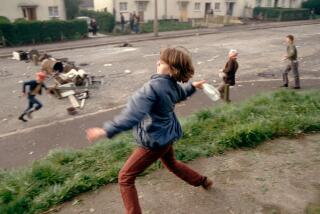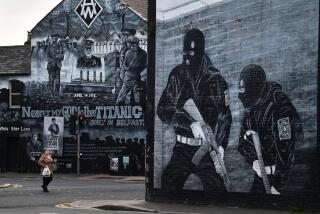Malta’s Citizens Like Their Firecrackers Loud and Politics Hot
- Share via
HAMRUN, Malta — There’s nothing the Maltese seem to love as much as their firecrackers. They like them even better when they’re mixed with politics.
On sultry summer and autumn evenings, the low hills that dot this small, arid island resound with the boom and crackle of fireworks--each barrage louder than the next--as religious feasts are celebrated.
Every town, or even groups within towns, tries to outdo the next in pomp, pageantry and pyrotechnics in commemorating one saint or another.
Yet even after the warm-weather saints are laid to rest for another season, many issues remain that divide the Maltese, sometimes culminating in bitter struggles that can break up families and disrupt the island’s idyllic facade.
Country Divided
Most of these debates--whether about the chronic water shortage or the financing of church schools--break down along political lines.
Malta’s 326,000 residents are split in half between the ruling Socialists and the opposition Nationalist Party. And though there’s relative quiet after some stormy years following the controversy-marred 1981 elections, the chasm is growing wider as the next elections--expected early this year--approach.
Political debates are a favorite pastime on this 153-square-mile island south of Italy, giving newspapers plenty to write about and spurring 95% election turnouts. Political party clubhouses are social centers.
“Politics is our national sport,” Joe Cassar, an editor for the Nationalist Party Press, said.
Few events escape political overtones.
Some Citizens Uncomfortable
Here in Hamrun, during celebrations honoring St. Gaetan, rival band clubs wear the colors of the two opposing political parties--red for the Socialists and blue for the Nationalists.
Many Maltese are uncomfortable with this intense politicization. They aren’t sure whether they like their youngsters returning from school chanting political slogans.
“This island is plagued with politics,” resident Joe Merceica said. “When you see a person coming down the street, the first question is not whether he or she is sexy or handsome, but what color are they--red or blue?”
The festivities in Hamrun, among the island’s most lavish, culminate in a marathon Sunday march. For seven hours, the St. Gaetan and the St. Joseph brass bands and their rowdy supporters march under a blazing Mediterranean sun, trading serenades, catcalls and their beloved, ear-splitting firecracker salutes.
Senses Bombarded
Stinging smoke and the shrill whistle of Roman candles bombard the senses of spectators crowding the narrow streets. Waving banners and cheering wildly for their favorites, they wash down the spicy Maltese timpana meat pies and sweet nougat candy with soda pop and beer.
All are sweaty, many are drunk, but nothing dampens the lusty spirit of competition. In 1985, the two band clubs began trading beer bottles as well, but the parish priest helped them patch up their differences.
In 1986, they got together and marched over to the home of Prime Minister Karmenu Mifsud Bonnici, who lives around the corner from the band clubs, to protest a threatened fee hike for police protection. The strategy worked and the fees were not changed.
Also last year, there were conciliatory speeches and an exchange of trophies between the two club leaders.
‘Symbol of Unity’
“It’s a symbol of unity between the people of Hamrun,” St. Gaetan President John Buttigieg said, holding his trophy aloft during a torchlight ceremony. “Our rivalry has transformed itself into positive competition, making Hamrun a center of peace and unity.
“We can set an example for other parts of the island and for other sectors of public life.”
And yet, with celebrations reaching their climax, recruits from both clubs hastily collect the empty bottles that have piled up along curbs and break up scattered fistfights. Long police cordons line the streets and help prod the participants back into their clubhouses as day fades into evening.
Taxi driver Joe Pisani, a Socialist who concedes that he is “a fanatic for politics,” is angry that the “blues” put on a better show last year. “They’ve got the money,” he said, scowling darkly. The Nationalists are known for attracting a wealthier, more conservative constituency.
Rivalries, it seems, die hard in Malta.
Divisive Issue
It was nearly three years ago that the political rivalry took a turn that nearly tore the island in two.
At issue was Socialist-sponsored legislation passed in July, 1984, that was aimed at Roman Catholic church schools and property, striking a sensitive nerve. Malta’s population is 98% Catholic.
The government told church schools that they couldn’t charge tuition and sought to expropriate large chunks of church property that weren’t clearly documented by title. The archbishop was barred from visiting public schools. Permits for new churches were held up without explanation.
The church took the government to court to stop the legislation, but the battle didn’t stop there.
Licenses Suspended
In August, 1984, the state suspended the licenses of eight church-run schools that ignored the no-tuition rule. The next month, the church responded by closing all 20 of its schools--affecting 25% of Malta’s school children.
Public school children were dropped off for classes under heavy guard so they wouldn’t be harassed by anti-Socialists. Churches held secret classes, changing locations to avoid thugs from the other side.
“Dads hung outside while the moms were inside teaching,” said Vicky Merceica, a 32-year-old housewife who sends her three young daughters to a church school. “We were very secretive because it was such a volatile situation. The children were scared; I was scared.”
Then in October, amid the stalemate, several hundred Labor Party supporters staged a rally in the capital of Valletta that turned ugly. Several Nationalists were beaten and the archdiocese offices were ransacked. Then came a series of car-bombings against both sides.
‘Brink of Civil War’
The country, remembers Minister of Information Leo Brincat, was on “the brink of civil war. It was a very loaded climate.”
Emergency sessions followed between government and church officials in which they reached a temporary agreement that allowed all schools to stay open.
It was the first of many such sessions. The latest was at the end of this summer, when Mifsud Bonnici--whose brother is a priest--and church leaders agreed to share the costs of educating children at Catholic schools.
No final accord has been reached, however, and the potentially explosive legal case is stalled on technicalities in Malta’s courts.
Tensions Eased
A church spokesman, the Rev. Joe Borg, said the dispute has eased over the last 2 1/2 years. “But the fact is, we can’t afford to hold tuition-free classes indefinitely,” he said.
Like most issues in Malta, the church-state question has a past.
Until a 1969 truce between the Labor Party and the church, it was considered a mortal sin to vote Socialist or even to read a Socialist newspaper. That followed a long and bitter dispute--ended in 1966--over the island’s main Catholic cemetery, when the church relegated the Socialist dead to a section for castoffs known as “the rubbish heap.”
“To be fair,” the Nationalist’s Cassar said, “a lot of the Socialists were really hurt by the church in the 1960s.”
No Anti-Church Sentiment
Said the government’s Brincat: “There are wounds that have been hard to heal. But I don’t think our party harbors any anti-church sentiment. I’m sure good will will prevail.”
Both sides agree, to a point, that Bonnici’s low-key, conciliatory tone has soothed some of the hurt left by his confrontational predecessor and fellow Socialist, Dom Mintoff.
More to Read
Sign up for Essential California
The most important California stories and recommendations in your inbox every morning.
You may occasionally receive promotional content from the Los Angeles Times.













